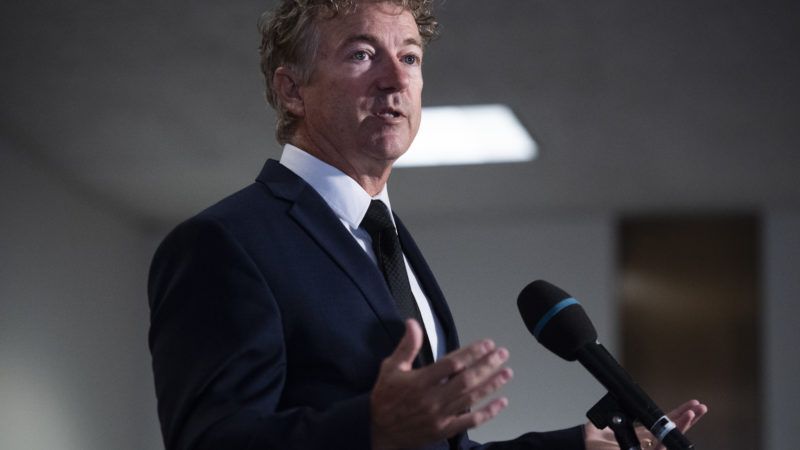Rand Paul on Republican Plans for Another Coronavirus Stimulus Bill: 'They Simply Don't Care About the Debt'
Congress is currently debating what should be included in the next trillion-dollar (and counting) stimulus bill, but nothing is likely to pass this week.

Amid a sweltering heatwave in the nation's capital, temperatures were also soaring on Tuesday afternoon inside a meeting where Republican senators attempted to settle what should be included in the next trillion-dollar-plus coronavirus stimulus package.
Sen. Rand Paul (R–Ky.) reportedly emerged from that meeting with some heated words for his colleagues. He told reporters gathered outside the luncheon meeting that he was "alarmed" by the idea of spending "another $1 trillion we don't have" and objected to the idea of sending another round of stimulus checks to Americans who haven't lost their jobs. "They are ruining the country," he said of his colleagues, according to CNN's Manu Raju.
And Paul was still hot under the collar an hour later, as he tweeted out his objections to spending more money on the Department of Education and slammed Republicans for their budgetary hypocrisy.
The majority of Republicans are now no different than socialist Democrats when it comes to debt. They simply don't care about debt and are preparing to add at least another trillion dollars in debt this month, combined with the trillions from earlier this summer.
— Rand Paul (@RandPaul) July 21, 2020
Paul has a point. The budget deficit—the gap between the federal government's spending and its tax revenues—might be the only thing in D.C. that's higher than the thermometers right now.
Last week, the Congressional Budget Office (CBO) reported that the deficit for the month of June was an eye-watering $864 billion. As Reason's Peter Suderman noted at the time, that's more than the entire annual budget deficit for 2017 ($665 billion) or 2018 ($779 billion). In one single month, Congress put more on the national credit card than it did in any full year during the George W. Bush administration. It is more than 100 times larger than the federal budget deficit for the month of June 2019, which rang in at a paltry $8 billion.
Of course, June 2020 was nothing like June 2019 in many ways. Hopefully, this year's extraordinary circumstances will be remembered as a huge historical outlier.
Still, the expense of the federal government's response to the COVID-19 pandemic is going to be with us for a while. Congress has already committed about $3.6 trillion in emergency funds and stimulus to fighting the coronavirus (and trying to limit the economic damage lockdowns have caused). Keep in mind that the federal government was already on track to add roughly $1 trillion to the national debt this year before the pandemic hit (that's why it's important to balance the books while things are going well).
Now, Congress is preparing another round of coronavirus spending. The House has already passed a $3 trillion spending package, but Senate Republicans have balked at those levels. There is significant disagreement between the two halves of Congress about what should be included in the next stimulus package. The White House is reportedly pushing for a payroll tax cut that some top Republicans, like Senate Finance Committee Chair Chuck Grassley (R–Iowa), aren't thrilled about.
The smaller package being crafted by Senate Republicans would reportedly include another round of $1,200 checks for many Americans, though potentially with more limitations on who will receive them. It may also include another $150 billion for the Paycheck Protection Program (PPP), which is providing loans to businesses in order to keep some workers on payrolls and out of the unemployment line. And it could include legal provisions to protect businesses from lawsuits if clients or patrons catch COVID-19, as well as pay for more coronavirus testing—Trump has voiced support for the former, but the White House has reportedly objected to the latter detail.
The one thing that seems certain is that the bill will not pass as swiftly as earlier coronavirus responses. Senate Majority Leader Mitch McConnell (R–Ky.) reportedly laughed out loud on Tuesday when asked if the bill could pass before the end of the week (the timeline that the White House is seeking).
The Trump administration also wants, according to The Washington Post, to boost federal funding for schools, mostly funded at the state and local levels, as a way to encourage them to open in the fall. But some Republican lawmakers, including Sen. Mitt Romney (R–Utah), have thrown cold water on that idea.
It was that provision that seemed to be at the center of Paul's objections as he exited the Senate GOP meeting on Tuesday. "They're going to spend $105b more on education, more than we spend every year on the Dept of Education," he tweeted. "Anyone remember when Reagan conservatives were for eliminating the Federal Dept. of Education?"
You might also recall a time when Republicans wanted to shrink the deficit. They'd largely abandoned that stance long before the coronavirus arrived—during the first three years of Trump's tenure, the national debt increased by more than $4.7 trillion.
Having wasted the opportunity to cool off the spending binge and put the country in a better position to deal with a crisis, Congress now appears ready to do the only thing it knows how: spend even more.


Show Comments (156)